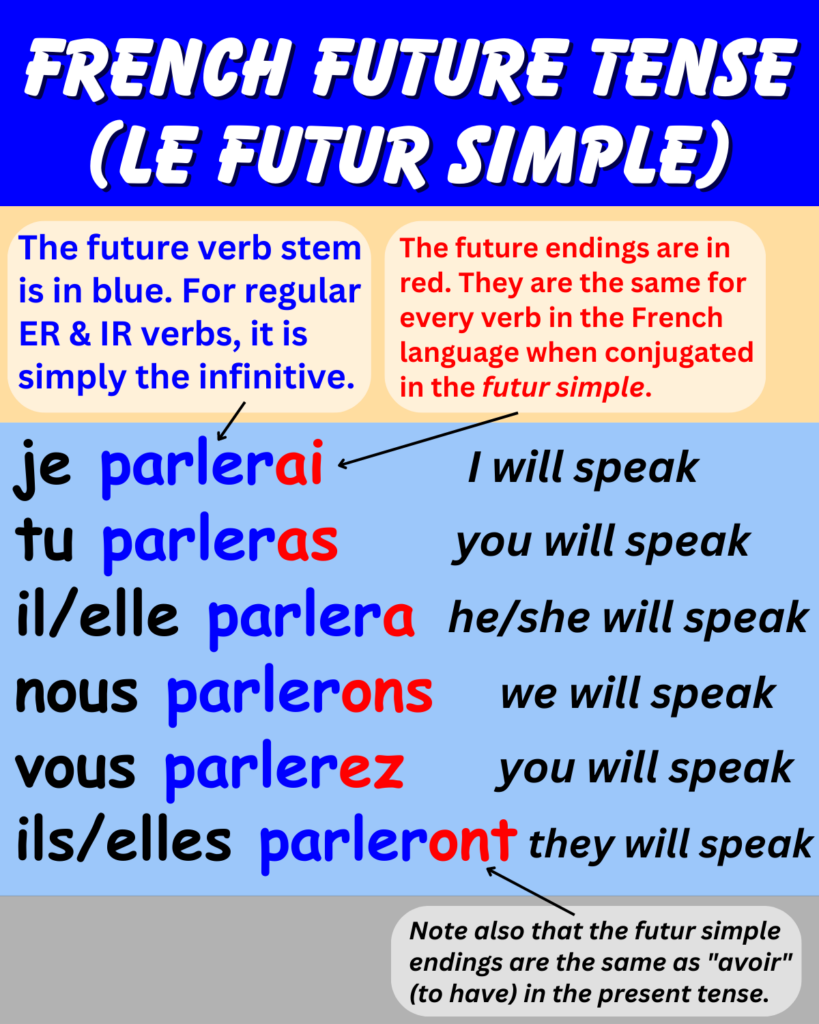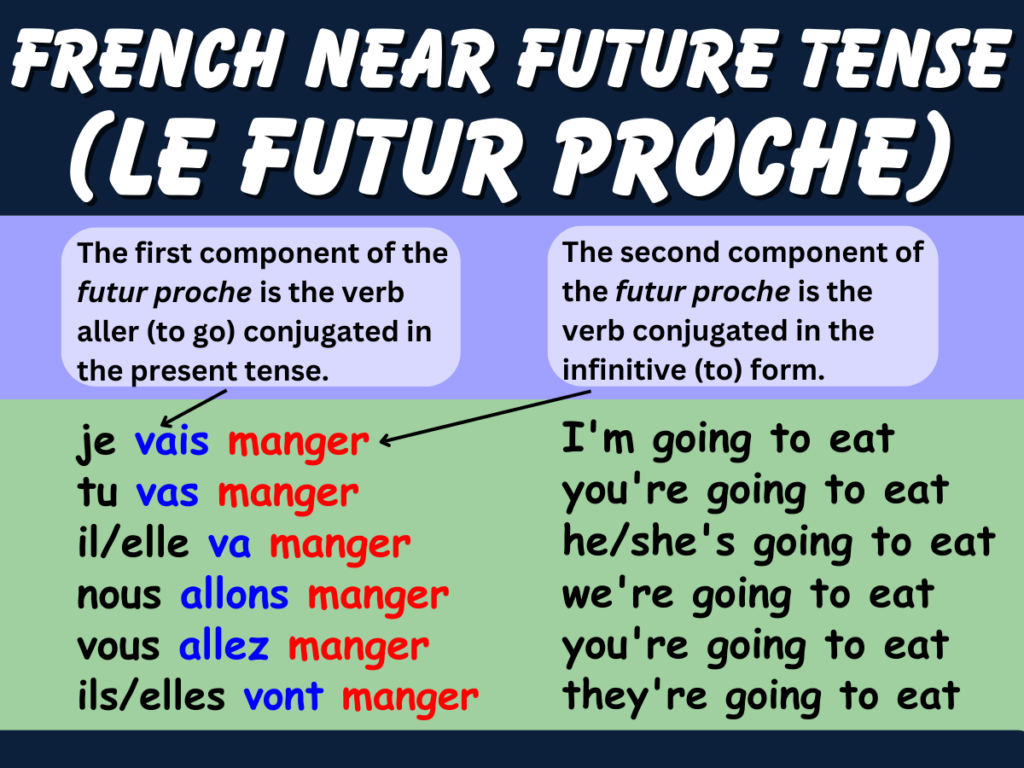French future tense conjugations
The French future tense (futur simple) is formed by adding the future ending (-ai, -as, -a, -ons, -ez, -ont) to the future stem. For example, je parlerai (I will speak), tu parleras (you will speak), il, elle parlera (he, she will speak), nous parlerons (we will speak), vous parlerez (you will speak) and ils, elles parleront (they will speak).

Another future tense called the futur proche is formed by combining the present tense of aller (to go) with an infinitive. For example, je vais parler (I am going to speak).
Futur simple endings for regular verbs

In French, the futur simple endings (-ai, -as, -a, -ons, -ez, -ont) are the same for every verb in the the language.
For regular -er and -ir verbs, the future stem is the infinitive of the verb. For regular -re verbs the future stem is the infinitive minus the -e.
The following table shows the futur simple endings for regular verbs.
| PARLER TO SPEAK | |
| je parlerai tu parleras il parlera | nous parlerons vous parlerez ils parleront |
| FINIR TO FINISH | |
| je finirai tu finiras il finira | nous finirons vous finirez ils finiront |
| VENDRE TO SELL | |
| je vendrai tu vendras il vendra | nous vendrons vous vendrez ils vendront |
Irregular verb stems
Many French verbs have an irregular stem in the futur simple. This means that rather than just adding the ending of the infinitive (je parlerai), the infinitive appears in a completely different spelling.
For example, for the verb “être“ (to be), the futur simple is je serai (I will be).
| Infinitive | English | Irregular Stem | English |
| aller | to go | j'irai | I'll go |
| apercevoir | to notice | j'apercevrai | I'll notice |
| avoir | to have | j'aurai | I'll have |
| courir | to run | je courrai | I'll run |
| devenir | to become | je deviendrai | I'll become |
| devor | must, have to | je devrai | I'll have to |
| envoyer | to send | j'enverrai | I'll send |
| être | to become | je serai | I'll become |
| faire | to make, do | je ferai | I'll make, do |
| falloir | to be necessary | il faudra | It will be necessary |
| mourir | to die | je mourrai | I'll die |
| pleuvoir | to rain | il pleuvra | It will rain |
| pouvoir | can, to be able to | je pourrai | I'll be able to |
| recevoir | to receive | je recevrai | I'll receive |
| revenir | to come back, return | je reviendrai | I'll be back |
| savoir | to know | je saurai | I'll know |
| tenir | to hold | je tiendrai | I'll hold |
| valoir | to be worth | il vaudra | It will be worth |
| venir | to come | je viendrai | I'll come |
| voir | to see | je verrai | I'll see |
| vouloir | to want | je vourai | I'll want |
| ER verbs with stem/spelling changes | |||
| acheter | to buy | j'achêterai | I'll buy |
| appeler | to call | j'appellerai | I'll call |
| employer | to hire | j'emploierai | I'll hire |
| essuyer | to wipe | j'essuierai | I'll wipe |
| jeter | to throw | je jetterai | I'll throw |
| nettoyer | to clean | je nettoierai | I'll clean |
| préférer | to prefer | je préférerai | I'll prefer |
| s'asseoir | to sit | je m'assiérai or je m'assoirai | I'll sit |
Futur simple uses
The following example sentences all use the futur simple. You will see that they all include an element of uncertainty.
- Si j’ai l’argent, j’achèterai la voiture. I’ll buy the car if I have the money.
- J’espère qu’elle viendra demain. I hope she’ll come tomorrow.
- Je pense qu’il pleuvra demain. I think it’ll rain tomorrow.
- Je crois que les enfants seront très heureux. I believe the kids will be very happy.
Future-future rule
There is a grammatical in French which I called the “future-future” rule. In English, you say “I will call you when I arrive”.
In French, the futur simple is used for both verbs in this kind of sentence. Hence it would look like: “I WILL call you when I WILL arrive” or “Je vous téléphonerai quand j’ariverai”.
The following sentences are examples of the future-future rule. The trigger words for this rule are underlined.
- Je t’appellerai dès que j’aurai les nouvelles. I’ll call you once I get the news.
- Je partirai en vacances quand il fera beau. I’ll go on vacation when it’s nice out.
- Il se couchera dès qu‘il finira son travail. He’ll go to bed once he finishes his work.
- J’achèterai une maison quand j’aurai assez d’argent. I’ll buy a house when I have enough money.
Si clause sentence with futur simple
The futur simple can be used in sentences like, “If I have the money, I will buy the car”. “Si j’ai l’argent, j’achetèrai la voiture”. The rule is: Si + present tense, then + futur simple. Here are some examples:
- Si j’ai le temps, je partirai en vacances. I’ll go on vacation if I have the time.
- Si j’ai les moyens, j’acheterai le bateau. I’ll buy the boat if I can afford it.

Futur antérieur (past future tense)
The futur antérieur (past future tense) is used to describe actions that will have happened in the future. For example, J’aurai mangé (I will have eaten).
- For verbs which use avoir (to have) as an auxiliary verb in the passé composé, the futur anérieur is formed with avoir conjugated in the future and the past participle.
- For verbs which use être as an auxiliary verb in the passé composé, conjugate être in the future and add the past particle.
Futur antérieur conjugation
The following table summarizes the conjugations for the French past future tense and includes a reflexive verb.
| PARLER TO SPEAK -> WILL HAVE SPOKEN | |
| j'aurai parlé tu auras parlé il aura parlé | nous aurons parlé vous aurez parlé ils auront parlé |
| ALLER TO GO -> WOULD HAVE GONE | |
| je serai allé(e) tu seras allé(e) il/elle sera allé(e) | nous serons allé(e)s vous serez allé(e)(s) ils/elles seront allé(e)s |
| SE LEVER -> WILL HAVE GOTTEN UP | |
| je me serai levé(e) tu te seras levé(e) il/elle se sera levé(e) | nous nous serons levé(e)s vous vous serez levé(e)(s) ils/elles se seront levé(e)s |
Futur antérieur example sentences
The future perfect can be used in straight “will have happened” sentences as well as form anteriority – Action A will have happened before action B.
“Will have” sentences
This following are examples of straight “will have” sentences.
- J’aurai appris tous ces verbes avant la fin de l’année. I will have learned all these verbs before the end of the year.
- Tu aura déjà trouvé un nouveau boulot avant juillet. You will have already found a new job before July.
- Nous aurions acheté une nouvelle maison avant 2022. We will have bought a new house before 2022.
Anteriority examples
The following example sentences introduce the idea of “anteriority”: When action A occurs, action B will have already occurred.
- Quand tu arriveras à la maison, j’aurai déjà fini mon repas. When you get home, I’ll already have finished my meal.
- Quand elle partira, je serai déjà parti. When she leaves, I’ll already have left.
- Dès que tu accepteras ma décision, nous en parlerons. Once you accept my decision, we’ll talk about it.
Probability
The following example sentences express probability: Action A should have happened.
- Il aura encore oublé le rendez-vous! He must have forgotten the meeting again!
- Elle aura encore brûlé le gateau! She must have burnt the cake again!
- Ils auront encore raté l’examen! They must have failed the exam again!
Whether
The following example sentences cover the concept of “whether” – “I wonder if + completed action”.
- Je me demande si elle sera venue. I wonder if she came.
- Je voudrais savoir s’ils auront fini les devoirs. I’d like to know if they finished the homework.
- Je me demand s’il se sera rendu compte de sa faute. I wonder if he realized his mistake.

Futur proche: Near future tense
The futur proche is formed by following a conjugated form of aller + infinitive. For example, je vais manger (I’m going to eat). Je vais is the conjugated form of aller in the first-person singular form and manger is the infinitive of to eat.
Futur proche conjugation

Futur proche uses and examples
The futur proche often suggests a high level of certainty, meaning it is very likely that the event will happen in the future.
The name of the tense is literally the “near” future tense, the described event can occur both in the immediate (next few minutes) or more distant (next few years) future.
The main point is that there is that the level of certainty is higher than the futur simple, which we will see below.
Example sentences:
- Je vais acheter les billets. I am going to buy the tickets (it is certain; I have a reservation).
- Nous allons dîner au restaurant. We are going to eat out (again it is certain, we have a reservation).
- Ils vont achter la maison. They are going to buy the house (Again, it is certain – they got approved for the loan).
Negation
To negate the future proche, wrap ne…pas around the conjugated form of aller. This page on our site covers French negation rules in detail.
- Je ne vais pas manger. I’m not going to eat.
- Il ne va pas travailler. He’s not going to dance.

Summary
There are two ways to express the future in French: The futur proche and the future simple.
The futur simple describes slightly less certain events and is formed by adding endings to the infinitive (Je parlera; I will speak).
The futur proche has a high degree of certainty is formed with aller + infinitive (Je vais parler; I am going to speak).
The futur antérieur describes events which which will have occurred in the future (J’aurai mangé; I will have eaten).

Related lessons:
- French verbs overview
- Conditional Tense
- Passé Composé Overview
- Plus-Que-Parfait
- French imperfect tense
- French subjunctive mood
- Passé simple explanation
More resources:
- laits.utexas.edu (includes exercise)
- Furur simple – Collins Dictionary




